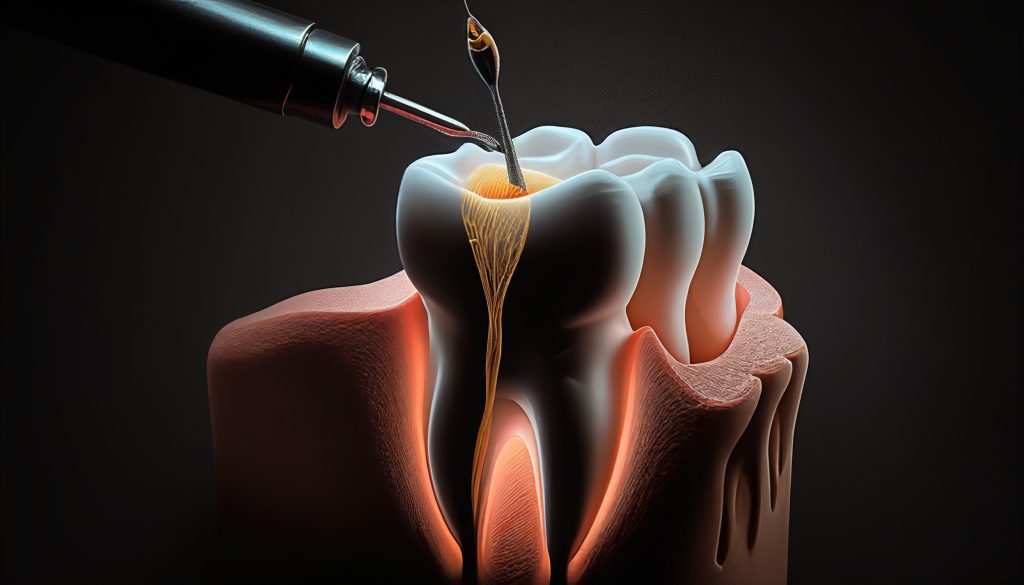
Parkway Dental Center: Saving Your Natural Smile
At Parkway Dental Center in Minneapolis, Minnesota, we understand that excellent dental health is an essential part of your overall well-being. Our dedicated team of professionals is committed to providing high-quality dental care. We offer many services to address various dental issues.
One standard procedure we perform is Root Canal Therapy, or “root canal.” Let’s define what root canal therapy is, explain why you might need it, address common misconceptions, and emphasize how it is a vital treatment for preserving your natural teeth.
What is Root Canal Therapy?
Root Canal Therapy, or endodontic therapy, is a dental procedure that focuses on treating the interior of a tooth, specifically the pulp and nerve chamber. The pulp, located in the tooth’s center, contains nerves, blood vessels, and connective tissues. When the pulp becomes infected or inflamed, it can cause severe discomfort. It can eventually lead to the loss of the tooth if left untreated.
The primary purpose of this therapy is to remove the infected or damaged pulp, disinfect the tooth’s interior, and then seal it to prevent further infection. By doing so, the tooth can be saved and maintained in your mouth for years.
Why Might You Need Root Canal Therapy?
A root canal is necessary when the pulp of a tooth is compromised. Several factors can lead to pulp damage or infection, and they include:
Dental Decay – Tooth decay is one of the most common reasons for pulp infection. When a cavity goes untreated and penetrates deep into the tooth, it can reach the pulp, leading to infection and pain.
Dental Trauma – A traumatic injury, such as a severe blow to the mouth, can cause the pulp to become damaged or infected. It often results in intense pain and requires immediate treatment.
Repeated Dental Procedures – Teeth with multiple dental procedures, such as fillings or crowns, may eventually develop pulp issues. The cumulative stress on the tooth can compromise the pulp’s health.
Cracked or Fractured Teeth – A cracked or fractured tooth can create a pathway for bacteria to enter the pulp, leading to infection and discomfort.
Dental Abscess – An abscess is a pus-filled pocket that forms at the root of a tooth. This is a sign of a severe infection that may necessitate a root canal to eliminate the infection and save the tooth.
The Benefits of Root Canal Therapy
Root canal therapy offers several key benefits:
Pain Relief – The primary goal of a root canal is to alleviate the pain and discomfort caused by an infected or inflamed tooth pulp. Patients typically experience significant pain relief following the procedure.
Preservation of Natural Teeth – Saving your natural teeth is crucial for maintaining proper oral function and aesthetics. Root canal therapy allows you to keep your original tooth, preventing the need for costly and time-consuming tooth replacement options.
Improved Oral Health – By eliminating the source of infection and preventing its spread, root canal therapy helps improve overall oral health and reduces the risk of further dental problems.
Efficient and Quick Procedure – Modern root canal procedures are efficient and can often be completed in one visit, saving you time and minimizing the inconvenience of multiple appointments.
The Root Canal Procedure
A root canal procedure typically involves the following steps:
- X-rays and Diagnosis: The dentist will begin by taking X-rays to assess the extent of the damage and plan the treatment. After diagnosing the issue, they will discuss the treatment plan with you.
- Local Anesthesia: Local anesthesia is administered to ensure you are completely numb and comfortable throughout the procedure.
- Isolation: A rubber dam is placed around the tooth to keep it dry and saliva-free during the procedure.
- Access Opening: A small access hole is created in the tooth’s crown to reach the pulp chamber and root canals.
- Cleaning and Shaping: The infected or damaged pulp is removed, and the tooth’s interior is thoroughly cleaned and shaped.
- Disinfection: The root canals are disinfected to eliminate any remaining bacteria.
- Filling: Once the tooth is cleaned and disinfected, it is filled with a biocompatible material called gutta-percha to seal the canals.
- Restoration: In most cases, a dental crown is placed on the treated tooth to protect it and restore its strength and appearance.
Root Canal Therapy Aftercare and Recovery
After a root canal procedure, it’s common to experience mild discomfort or soreness, managed with over-the-counter pain medication. It’s essential to follow any post-treatment instructions your dentist provides, including maintaining good oral hygiene practices.
Debunking the Myths: Root Canals are Not Painful
It’s not uncommon for root canals to have a bad reputation due to misconceptions and outdated information. The truth is, root canal therapy is not the painful and dreaded procedure it’s often made out to be. In fact, a root canal relieves pain and discomfort caused by infection. The process itself is virtually painless, thanks to modern techniques and anesthetics.
Root Canal Therapy | Your Natural Smile is Worth Saving
At Parkway Dental Center, we want to emphasize that root canal therapy is a valuable and effective dental treatment designed to save your natural teeth and relieve pain. Don’t let misconceptions about root canals deter you from seeking the necessary care. Our dental team is dedicated to providing gentle and efficient root canal therapy, ensuring comfort and satisfaction.
If you are experiencing dental pain, sensitivity, or suspect you may need a root canal, don’t hesitate to contact us. We are here to help you preserve your beautiful, natural smile while ensuring your oral health. Please schedule an appointment today to discuss your concerns and explore your treatment options. Your comfort and well-being are our top priorities at Parkway Dental Center.


